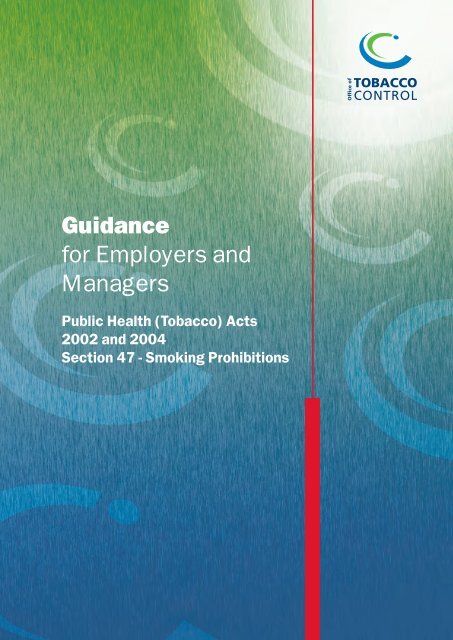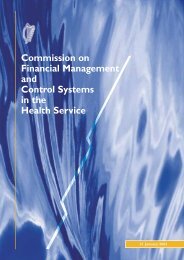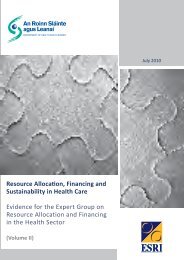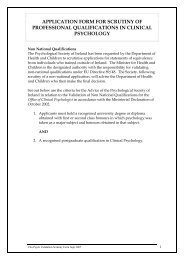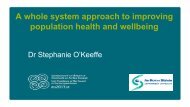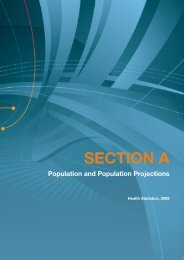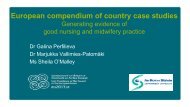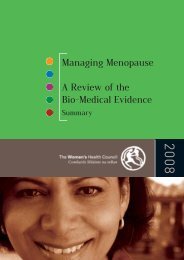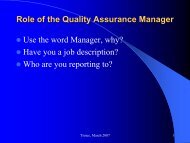Guidance for Employers and Managers
Guidance for Employers and Managers
Guidance for Employers and Managers
You also want an ePaper? Increase the reach of your titles
YUMPU automatically turns print PDFs into web optimized ePapers that Google loves.
<strong>Guidance</strong><br />
<strong>for</strong> <strong>Employers</strong> <strong>and</strong><br />
<strong>Managers</strong><br />
Public Health (Tobacco) Acts<br />
2002 <strong>and</strong> 2004<br />
Section 47 - Smoking Prohibitions
<strong>Guidance</strong><br />
<strong>for</strong> <strong>Employers</strong> <strong>and</strong><br />
<strong>Managers</strong><br />
Public Health (Tobacco) Acts<br />
2002 <strong>and</strong> 2004<br />
Section 47 - Smoking Prohibitions<br />
Office of Tobacco Control<br />
Clane Shopping Centre<br />
Clane, Co Kildare<br />
Tel: +353 45 892 015<br />
Fax: +353 45 892 649<br />
Website: www.otc.ie<br />
email: info@otc.ie<br />
© March 2004<br />
Office of Tobacco Control<br />
<strong>Guidance</strong> <strong>for</strong> <strong>Employers</strong> <strong>and</strong> <strong>Managers</strong><br />
1
Public Health Tobacco Acts 2002 <strong>and</strong> 2004<br />
Section 47 - Smoking Prohibitions<br />
Background<br />
As far back as 1986, the US Surgeon General<br />
proclaimed, “Passive smoking is a cause of<br />
disease including lung cancer, in healthy<br />
non-smokers”. Agreement with this view<br />
has grown steadily since then <strong>and</strong> the leading<br />
international scientific authorities concur that<br />
exposure to environmental tobacco smoke (ETS)<br />
causes serious <strong>and</strong> fatal diseases. In 2002 the<br />
International Agency <strong>for</strong> Cancer Research (IARC)<br />
of the World Health Organisation declared ETS to<br />
be a known human carcinogen <strong>and</strong> highlighted<br />
that it is a cause of increased risk of coronary<br />
heart disease. Awareness of the harmful effects<br />
of environmental tobacco smoke (ETS) places<br />
an onus on governments to protect public health<br />
by providing legislation to protect the general<br />
public from involuntary smoking.<br />
An independent scientific report commissioned<br />
by the Office of Tobacco Control <strong>and</strong> the Health<br />
<strong>and</strong> Safety Authority “The Health Effects of<br />
Environmental Tobacco Smoke (ETS) in the<br />
Workplace”, 2003, concluded that exposure to<br />
ETS or second-h<strong>and</strong> smoke, also known as<br />
passive smoking, causes lung cancer, heart<br />
disease <strong>and</strong> respiratory problems. The report also<br />
concluded that workers need to be protected from<br />
exposure to ETS at work; that current ventilation<br />
technology is ineffective at removing the risk of<br />
ETS to health; <strong>and</strong> that legislative measures are<br />
required to protect workers from the adverse<br />
health effects of ETS exposure.<br />
Subsequently, a prohibition on smoking in<br />
enclosed workplaces, including licensed<br />
premises, was introduced under Section 47<br />
of the Public Health (Tobacco) Act, 2002 as<br />
amended. Section 47 revoked the Tobacco<br />
(Health Promotion <strong>and</strong> Protection) Regulations,<br />
1995 that had prohibited <strong>and</strong> restricted the<br />
consumption of tobacco products in designated<br />
areas <strong>and</strong> facilities. Section 47 prohibits the<br />
smoking of tobacco products in workplaces<br />
with certain exceptions (see section 2).<br />
Overview<br />
This document is one of a series intended to<br />
in<strong>for</strong>m employers/managers of their obligations<br />
in respect of Section 47. A separate sector<br />
specific guidance document has been produced<br />
<strong>for</strong> the Licensed Trade as part of the series,<br />
in consultation with relevant parties. Further<br />
sector specific guidance will be prepared as<br />
required in response to common queries.<br />
This publication seeks to provide guidance<br />
to employers, occupiers, managers <strong>and</strong> other<br />
persons <strong>for</strong> the time being in charge of<br />
workplaces on how they may seek to comply<br />
with their legal obligations under Section 47 of<br />
the Public Health (Tobacco) Act, 2002 as<br />
amended <strong>and</strong> is without prejudice to any other<br />
legal obligations under criminal or civil law.<br />
Nothing in these Acts obliges an employer or<br />
manager to permit smoking or to provide a<br />
smoking area.<br />
The introduction of the workplace smoking ban<br />
will assist employers/managers in meeting their<br />
pre-existing common law duty of care <strong>and</strong> their<br />
statutory responsibility to provide a reasonably<br />
safe working environment.<br />
The exemption of a place or premises from the<br />
ban does not absolve the employer/manager of<br />
these responsibilities. <strong>Employers</strong> <strong>and</strong> managers<br />
with responsibility <strong>for</strong> premises that are exempted<br />
from the workplace smoking ban are advised to<br />
review their policies with a view to eliminating<br />
exposure where possible but at least to minimise<br />
exposure to ETS. Any smoking in exempted<br />
places or premises should be located such that<br />
smoke from these areas cannot enter the<br />
enclosed workplace <strong>and</strong> should ensure that<br />
employee exposure is minimised.<br />
The experience of employers in implementing<br />
workplace smoke-free policies has demonstrated<br />
the importance of having a written smoke-free<br />
policy as part of the change management<br />
process. Successful implementation of smokefree<br />
policies requires good communications<br />
with employees, thoughtful consultation,<br />
sufficient time <strong>for</strong> change <strong>and</strong> underst<strong>and</strong>ing<br />
towards smokers.<br />
2 Office of Tobacco Control<br />
<strong>Guidance</strong> Office <strong>for</strong> of <strong>Employers</strong> Tobacco Control <strong>and</strong> <strong>Managers</strong>
Public Health Tobacco Acts 2002 <strong>and</strong> 2004<br />
Section 47 - Smoking Prohibitions<br />
1. Aim<br />
This publication provides employers/managers with<br />
guidance on how they may endeavour to comply<br />
with their obligations arising from Section 47 of the<br />
Public Health (Tobacco) Act, 2002 as amended,<br />
which prohibits smoking in enclosed workplaces.<br />
For further in<strong>for</strong>mation concerning the application<br />
of the law employers/managers should contact the<br />
en<strong>for</strong>cement agencies i.e. the health boards<br />
(environmental health service) <strong>and</strong> the Office of<br />
Tobacco Control.<br />
2. Relevant Legislation<br />
Section 47 (1) of the Public Health (Tobacco) Act, 2002 as amended by Section 16 of the Public Health<br />
(Tobacco) (Amendment) Act, 2004 prohibits the smoking of a tobacco product in a specified place.<br />
Definitions<br />
For the purposes of Section 47 a ‘specified place’<br />
is defined as including:<br />
(a) a place of work,<br />
(b) an aircraft, train, ship or other vessel, public<br />
service vehicle, or a vehicle used <strong>for</strong> the<br />
carriage of members of the public <strong>for</strong> reward<br />
other than a public service vehicle, insofar as<br />
it is a place of work,<br />
(c) a health premises, insofar as it is a place<br />
of work,<br />
(d) a hospital that is not a health premises,<br />
insofar as it is a place of work,<br />
(e) a school or college, insofar as it is a place<br />
of work,<br />
(f) a building to which the public has access,<br />
either as of right or with the permission of the<br />
owner or occupier of the building, <strong>and</strong> which<br />
belongs to, or is in the occupation of–<br />
(i) the State,<br />
(ii) a Minister of the Government,<br />
(iii) the Commissioners of Public Works<br />
in Irel<strong>and</strong>, or<br />
(iv)a body established by or under an<br />
Act of the Oireachtas, insofar as it is a<br />
place of work,<br />
(g) a cinema, theatre, concert hall or other place<br />
normally used <strong>for</strong> indoor public entertainment,<br />
insofar as it is a place of work,<br />
(h) a licensed premises, insofar as it is a place<br />
of work, or<br />
(i) a registered club, insofar as it is a place<br />
of work.<br />
Exemptions<br />
Section 47 exempts certain classes of places or<br />
premises as follows:<br />
(a) a dwelling,<br />
(b) a prison,<br />
(c) subject to paragraph (d), a place or premises,<br />
or a part of a place or premises, that is<br />
wholly uncovered by any roof, whether fixed<br />
or movable,<br />
(d) an outdoor part of a place or premises<br />
covered by a fixed or movable roof, provided<br />
that not more than 50 per cent of the perimeter<br />
of that part is surrounded by one or more walls<br />
or similar structures (inclusive of windows,<br />
doors, gates or other means of access to or<br />
egress from that part),<br />
(e) a bedroom in—<br />
(i) a premises registered under Part III<br />
of the Tourist Traffic Act 1939 in a register<br />
established <strong>and</strong> maintained under<br />
that Part,<br />
(ii) a premises <strong>for</strong> the time being specified in<br />
a list published, or caused to be published,<br />
under section 9 of the Tourist Traffic Act<br />
1957, or<br />
(iii) any other premises in which a person<br />
carries on business, being a business<br />
that consists of or includes the provision,<br />
in those premises, of sleeping<br />
accommodation to members of the public,<br />
Office of Tobacco Control<br />
<strong>Guidance</strong> <strong>Guidance</strong> <strong>for</strong> <strong>Employers</strong> (final draft) <strong>and</strong> <strong>Managers</strong><br />
3
Public Health Tobacco Acts 2002 <strong>and</strong> 2004<br />
Section 47 - Smoking Prohibitions<br />
Exemptions Continued<br />
(f) a room that, in furtherance of charitable<br />
objects, is used solely <strong>for</strong> the provision of<br />
living accommodation,<br />
(g) in premises owned or occupied by a person<br />
whose main objects are the provision<br />
of education, a room that, in furtherance of<br />
those objects (other than objects relating to<br />
the provision of primary or secondary<br />
education), is used solely <strong>for</strong> the provision of<br />
living accommodation,<br />
(h) a nursing home,<br />
(i) a hospice,<br />
(j) a psychiatric hospital, or<br />
(k) the Central Mental Hospital.<br />
For relevant definitions refer to a copy of the<br />
Public Health (Tobacco) Act, 2004.<br />
Offences<br />
Under Section 47(2) of the Public Health<br />
(Tobacco) Acts a person who smokes in<br />
contravention of subsection (1) of that section<br />
is guilty of an offence.<br />
Under Section 47(3) of the Acts, where a person<br />
smokes in contravention of subsection (1) of that<br />
section, the occupier, manager or any other<br />
person <strong>for</strong> the time being in charge of the place<br />
where the contravention occurs shall each be<br />
guilty of an offence.<br />
Section 47(4) of the Acts establishes a defence<br />
<strong>for</strong> a person against whom proceedings are<br />
brought under Section 47(3), provided that they<br />
can demonstrate that they have made all<br />
reasonable ef<strong>for</strong>ts to ensure compliance with<br />
Section 47.<br />
Under Section 5(2A) of the Acts a person found<br />
guilty of an offence under Section 47 is liable on<br />
summary conviction to a fine of up to €3,000.<br />
3. Scope<br />
This document seeks to provide guidance on the<br />
practical steps that can be taken by employers,<br />
managers <strong>and</strong> other persons in charge of<br />
workplaces in which smoking is prohibited by<br />
Section 47 in endeavouring to make “all<br />
reasonable ef<strong>for</strong>ts” under section 47(3) <strong>and</strong> 47(4)<br />
of the Acts <strong>and</strong> is without prejudice to any other<br />
legal obligations under criminal or civil law.<br />
4. Compliance / En<strong>for</strong>cement<br />
<strong>Employers</strong> <strong>and</strong> managers should make all<br />
reasonable ef<strong>for</strong>ts to ensure that their staff,<br />
customers <strong>and</strong> visitors are aware of the<br />
prohibition on smoking in order to facilitate<br />
compliance with the law.<br />
<strong>Employers</strong> <strong>and</strong> managers should make all<br />
reasonable ef<strong>for</strong>ts to ensure that employees,<br />
customers <strong>and</strong> other visitors to their premises<br />
(e.g. sub-contractors) do not smoke in<br />
contravention of the law.<br />
<strong>Employers</strong> <strong>and</strong> managers who are made aware<br />
of a person smoking in contravention of the law<br />
should make all reasonable ef<strong>for</strong>ts to ensure that<br />
the contravention ceases <strong>and</strong> is not repeated.<br />
The recommended minimum reasonable ef<strong>for</strong>ts<br />
required are:<br />
a). Developing <strong>and</strong> implementing a<br />
smoke-free policy which ensures adequate<br />
communication by employers, managers <strong>and</strong><br />
those present in the workplace; <strong>and</strong> ensures<br />
that infringements by employees, customers,<br />
etc. are dealt with under local disciplinary<br />
procedures or otherwise as set out in more<br />
detail over-leaf (see section 5).<br />
b). Displaying “No Smoking” signs to alert staff,<br />
customers <strong>and</strong> visitors of the workplace<br />
smoking ban (see section 6).<br />
c). Removing all ashtrays <strong>and</strong> other like<br />
receptacles; <strong>and</strong> providing external stubbing<br />
bins at entrances where appropriate.<br />
4 Office of Tobacco Control<br />
<strong>Guidance</strong> Office <strong>for</strong> of <strong>Employers</strong> Tobacco Control <strong>and</strong> <strong>Managers</strong>
Public Health Tobacco Acts 2002 <strong>and</strong> 2004<br />
Section 47 - Smoking Prohibitions<br />
5. Smoke-Free Policy<br />
<strong>Employers</strong>/managers should together establish<br />
<strong>and</strong> implement a written policy <strong>and</strong> procedures to<br />
ensure compliance with the law as they are each<br />
potentially liable under Section 47(3) of the Public<br />
Health (Tobacco) Act, 2002 as amended (as are<br />
occupiers <strong>and</strong> “any other person <strong>for</strong> the time<br />
being in charge of a place”). This policy may <strong>for</strong>m<br />
part of your written Safety Statement, an existing<br />
requirement <strong>for</strong> all employers under health <strong>and</strong><br />
safety legislation.<br />
The policy should clearly identify the members of<br />
management <strong>and</strong> staff that have responsibility <strong>for</strong><br />
its implementation <strong>and</strong> specify the procedures to<br />
be followed in the event of non-compliance.<br />
The policy should acknowledge the right of<br />
employees to work in a smoke-free environment<br />
<strong>and</strong> in<strong>for</strong>mation on how to obtain help quitting<br />
smoking.<br />
This policy <strong>and</strong> associated procedures must<br />
be communicated to all staff <strong>and</strong> in particular to<br />
new <strong>and</strong> part-time staff be<strong>for</strong>e they commence<br />
employment. Action in relation to disciplinary<br />
procedures should be undertaken <strong>for</strong> violations<br />
of the smoke-free policy <strong>and</strong> this should be in line<br />
with the procedures used <strong>for</strong> violation of any other<br />
health <strong>and</strong> safety procedure. (A model smokefree<br />
policy is shown on page 6).<br />
6. Signage<br />
“No Smoking” signs should be conspicuously<br />
displayed so that the signs are clearly visible to<br />
all employees, customers <strong>and</strong> visitors while in the<br />
premises. All such signs should include the name<br />
of the person (owner/manager) to whom a<br />
complaint should be made in the event of<br />
non-compliance.<br />
A “No Smoking” sign should be permanently<br />
displayed in a conspicuous position at each<br />
entrance to the premises, at service counters,<br />
in toilet facilities <strong>and</strong> staff rooms.<br />
“No Smoking” signs should contain the<br />
international “No Smoking” symbol <strong>and</strong> be durable.<br />
(A model “No Smoking” sign is shown on page 8).<br />
Office of Tobacco Control<br />
<strong>Guidance</strong> <strong>Guidance</strong> <strong>for</strong> <strong>Employers</strong> (final draft) <strong>and</strong> <strong>Managers</strong><br />
5
Model Smoke-Free Workplace Policy<br />
Purpose<br />
Exposure to second-h<strong>and</strong> smoke/Environmental<br />
Tobacco Smoke (ETS) also known as passive<br />
smoking is a cause of disease, including lung<br />
cancer <strong>and</strong> heart disease, in third parties. Neither<br />
the simple separation of smokers <strong>and</strong> nonsmokers<br />
within the same airspace nor the<br />
provision of ventilation can eliminate exposure to<br />
ETS <strong>and</strong> the consequent health effects of such<br />
exposure. This policy has been developed to<br />
protect all employees, service users, customers<br />
<strong>and</strong> visitors from exposure to ETS, to ensure<br />
compliance with legal obligations <strong>and</strong> to ensure a<br />
safe working environment.<br />
Policy<br />
It is the policy of [INSERT NAME OF BUSINESS]<br />
that all of its workplaces are smoke-free <strong>and</strong><br />
that all employees have a right to work in a<br />
smoke-free environment.<br />
Smoking is prohibited throughout the entire<br />
workplace with no exceptions. This policy applies<br />
to all employees, consultants, contractors,<br />
customers <strong>and</strong> visitors.<br />
Implementation<br />
Overall responsibility <strong>for</strong> policy implementation<br />
rests with the occupier, manager or other person<br />
<strong>for</strong> the time being in charge of the workplace.<br />
All staff have an obligation to adhere to, <strong>and</strong><br />
facilitate the implementation of this policy.<br />
contractors of the policy <strong>and</strong> their role in the<br />
implementation <strong>and</strong> monitoring of the policy.<br />
All new <strong>and</strong> prospective employees, consultants<br />
<strong>and</strong> contractors shall be given a copy of the policy<br />
on recruitment/induction by the person in charge.<br />
The person in charge [………………..] shall<br />
in<strong>for</strong>m all existing employees, consultants <strong>and</strong><br />
Policy Infringements<br />
Infringements by staff will be dealt with under<br />
local disciplinary procedures. Infringements by<br />
customers, clients etc., will be dealt with in<br />
accordance with the procedure set out below.<br />
Employees, consultants, contractors, customers<br />
<strong>and</strong> visitors who contravene legislation prohibiting<br />
smoking in the workplace are also liable to a<br />
criminal prosecution with an associated fine.<br />
Smoking Cessation<br />
In<strong>for</strong>mation on how to obtain help quitting smoking<br />
is available from [………............] e.g. The National<br />
Smokers Quitline (1850 201 203) or the Health<br />
Promotion Service of the local health board.<br />
6 Office of Tobacco Control<br />
<strong>Guidance</strong> Office <strong>for</strong> of <strong>Employers</strong> Tobacco Control <strong>and</strong> <strong>Managers</strong>
Procedure if a person smokes in contravention of<br />
the law prohibiting smoking in the workplace<br />
1. Draw the person’s attention to the “No Smoking” signs <strong>and</strong><br />
advise that they are committing an offence by smoking on<br />
the premises.<br />
2. Advise the person that it is also an offence <strong>for</strong> the<br />
occupier, manager <strong>and</strong> any other person <strong>for</strong> the time being<br />
in charge of the premises to permit anyone to smoke in<br />
contravention of the law.<br />
3. Advise the person that the business has a smoke-free<br />
policy to ensure a safe working environment <strong>for</strong> staff <strong>and</strong><br />
customers. And that under the policy staff are obliged to<br />
refuse service to customers who persist in smoking.<br />
4. If the person continues to smoke immediately<br />
request that they leave the premises.<br />
5. If the person refuses, implement normal procedure <strong>for</strong><br />
antisocial/illegal behaviour in the premises.<br />
6. Maintain an appropriate record of all such incidents<br />
<strong>and</strong> notify all staff of action taken.<br />
7. In all cases where physical violence is threatened<br />
or encountered, notify <strong>and</strong>/or seek the assistance<br />
of the Gardaí.<br />
Office of Tobacco Control<br />
<strong>Guidance</strong> <strong>Guidance</strong> <strong>for</strong> <strong>Employers</strong> (final draft) <strong>and</strong> <strong>Managers</strong><br />
7
Model “No Smoking” Sign<br />
8 Office of Tobacco Control<br />
<strong>Guidance</strong> Office <strong>for</strong> of <strong>Employers</strong> Tobacco Control <strong>and</strong> <strong>Managers</strong>
www.smokefreeatwork.ie<br />
provides in<strong>for</strong>mation on<br />
smoke-free workplaces<br />
Office of Tobacco Control<br />
Clane Shopping Centre<br />
Clane, Co Kildare<br />
Tel: +353 45 892 015<br />
Fax: +353 45 892 649<br />
email: info@otc.ie<br />
Website: www.otc.ie


